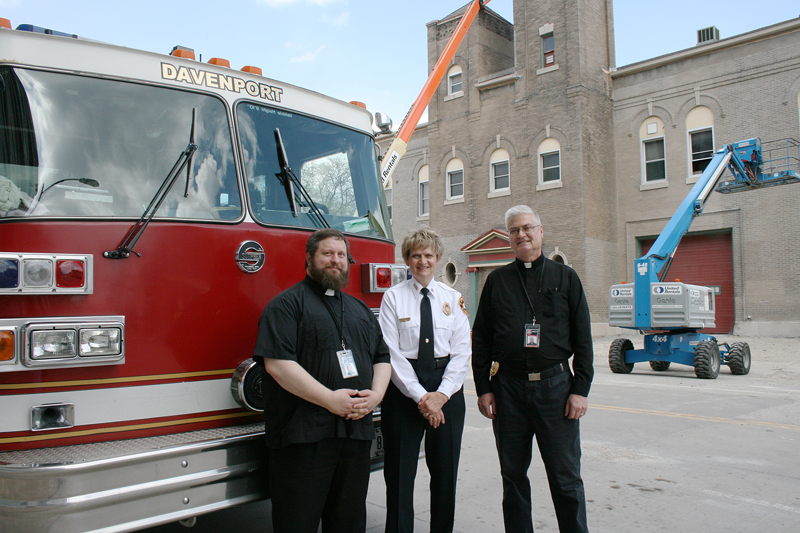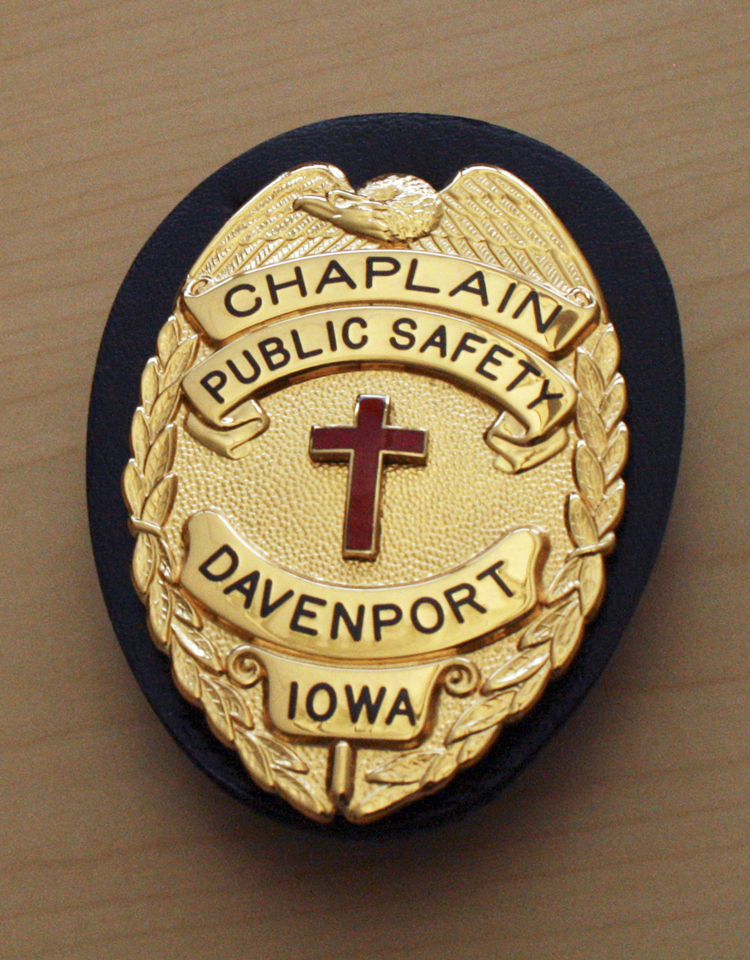By Barb Arland-Fye
The Catholic Messenger
What do priests do in their spare time? At least four of them in the Davenport Diocese volunteer as chaplains for police and/or fire departments in the communities they serve. That ministry provides them with a broader perspective of the lives of first responders and the people they assist, often in times of crisis and trauma.

Among the priests in the Davenport Diocese who serve as chaplains to first responders are Father Paul Appel, left, and Father Chris Young, right. They serve the Davenport Police and Fire departments. Standing between them is Davenport Fire Chief Lynn Washburn-Livingston.
Chaplains might ride along in squad cars or on fire engines, sit in on shift-change briefings, share a meal with first responders, or visit with them at the fire department or police station.
“I am very proud to be able to wear a Davenport Chaplain badge,” says Father Paul Appel. “These men and women do so much to protect and guard us and have worked hard to earn their own badges. I hope that by being a prayerful, supportive presence I can help them continue to serve our community faithfully and well.”
The most important skill he needs in this ministry, he said, is “the ability to put everyday occurrences into the context of God’s plan for us. A house fire or car accident can be a life-changing moment. I hope that all the people involved in such events can see God’s loving care for us even when tragedy strikes. Hopefully the care and comfort they receive from our first responders will be proof of that.”
A brother priest inspired Fr. Appel to volunteer as a chaplain even though he is plenty busy as judicial vicar for the diocesan Marriage Tribunal and moderator of St. Alphonsus and St. Mary parishes in Davenport and St. Peter Parish in Buffalo.
His brother priest, Father Jason Crossen, pastor of Our Lady of Lourdes Parish in Bettendorf, volunteers as chaplain for the Bettendorf Police Department. Previously, while serving as pastor of Ss. Mary & Mathias Parish in Muscatine, Fr. Crossen helped start a chaplaincy program for the Muscatine Fire Department in 2011. He enlisted help from the Muscatine Ministerial Association. Later, the Muscatine Police Department started a chaplaincy program which Father Jake Greiner, then parochial vicar at Ss. Mary & Mathias, was involved in.
“I really enjoyed getting to know the firefighters, paramedics and police officers and in time was asked to help in a variety of ways,” Fr. Crossen said. “Primarily, a chaplain is present for the firefighters, paramedics and police officers to help them and their families when they experience hardship, traumatic incidents, and mostly need a friendly ear to listen.”
The day Fr. Crossen moved into the rectory at Lourdes in Bettendorf, Sgt. Mike Piazza of the Bettendorf Police Department approached him and asked Fr. Crossen if he would be willing to join their team of chaplains. “I said yes right away…. With prior Military Police experience from my time in the National Guard, it seemed like a natural fit.”
Fr. Greiner, who now serves as pastor of St. Anthony Parish in Knoxville and Sacred Parish in Melcher, volunteers as a chaplain with the Marion County Sheriff’s Department. “With both departments, I volunteered to aid law enforcement officers, victims of crimes and perpetrators of crimes,” Fr. Greiner said. “Each of these groups may have spiritual needs that I can help to address. I feel that God has provided me with certain experiences that allow me to serve in this capacity. I can help a police officer process some difficult experiences on the job. I can help a victim begin the process of reclaiming their lives after a traumatic experience. I can be there to help a perpetrator begin to forgive himself/herself for the injuries that they have done to others.
“I also have been involved with the families of law enforcement officers, victims and perpetrators. Behind all of the people that we read about in the newspaper is a family that is affected as much as the person listed in the newspaper…. I also view my involvement in police chaplaincy as a means to serve the greater community since I interact with all members of the local community, not just my Catholic community.”

Fr. Greiner noted: “This ministry gives me better insight into the problems facing communities, and furthermore, it has allowed me to exercise mercy to those in most need of it on numerous occasions.”
Father Chris Young, who serves in solidum with Fr. Appel and Father Guillermo Trevino at St. Alphonsus, St. Mary and St Peter parishes, became a chaplain for the Davenport Police and Fire departments in March. He appreciates “serving people who have dedicated their lives to keeping us safe, who work in dangerous conditions, see a side of life … that is much in need of redemption, and whose duty is to sometimes experience trauma. They are often prevented — due to shifts they are required to work — from participating in parish liturgies and ministries.”
Some police and fire departments have separate chaplaincy programs. Davenport chose to combine efforts. Discussions had been ongoing, but the death of a longtime police officer while jogging off-duty in February 2014 was the impetus to begin the program, Davenport Police Chief Paul Sikorski said.
Information is plentiful when it comes to implementing programs to help prevent injuries to firefighters and police officers, or to help them recover, Davenport Fire Chief Lynn Washburn-Livingston noted. “However, emergency responders also suffer from emotional and psychological distress (injury or illness) as a result of the daily stress and frequent traumatic situations that are encountered. The chaplain program is an intervention that can address these emotional and psychological problems. Providing care and comfort to firefighters and police officers regardless of the source of their distress helps them deal with or manage the emotional and psychological challenges in order to maintain overall health. The chaplains are also available for victims of emergency incidents to provide care and comfort during and after the incident if requested.”
Four chaplains serve the Davenport Police and Fire departments: two Catholic priests and two ministers of other denominations; one of them, Chaplain Matthew Peterson, directs the program. Chaplains understand the need to maintain confidentiality “and to provide care and comfort from a non-denominational direction unless asked to be specific,” Washburn-Livingston said. “Over the last year, I have noticed the reduction of tentativeness as personnel have become more familiar with the chaplains and their work.”
A big benefit, Sikorski noted, is that first-responders have someone to turn to outside of the administration. When death or some other deep social issue is involved, officers can go to the chaplains for help, to get perspective. “It’s a great resource for us to bring to the community.”
Likewise, “Many of my parishioners are public servants, so these are some of the same people I see on Sunday,” Fr. Appel said. “Getting an insight into their experiences in law enforcement, rescue and the like helps me to bring the Gospel closer to where they are.”
Chaplains share memorable moments
The Catholic Messenger asked four priests who volunteer as chaplains of a police and/or fire department in the Diocese of Davenport to share a story or two.
“One of my most memorable events was going through the Citizens Fire Academy in Muscatine,” recalls Father Jason Crossen. “I learned an extensive amount of information that the department has to face daily. We also got to train with the firefighters. … I will never forget rappelling off of the fire tower. Jumping out of a three-story-high structure with only a harness and a rope was a moment of high anxiety, but with help and good training I made it safely to the ground! I also was able to fight a simulated fire in the mobile fire simulator. I was amazed at how dark smoke blocks light immediately, even masking the very flames themselves. I remember using that as a reference in one of my Sunday homilies about light and darkness.”
“One of my parishioners, a retired veteran firefighter, took me on a tour of all the fire houses in town,” Father Paul Appel recalls. “When we got to one of his old posts, the firefighters there did not want to talk about gear, fires or the new chaplain. They wanted his wife’s recipe (herself a retired firefighter) for sweet-and-sour green beans — so they could cook it for dinner at the fire house!”
“Can’t really share in a family newspaper,” Father Chris Young joked. “Suffice it to say that there is no amount of time or extent of effort that wouldn’t be taken by one firefighter when he wants to prank another firefighter!” He added, “I do know that what police officers or firefighters tell me won’t be repeated in my homilies!”
“In my ministry as a chaplain, I have given three different death notifications with a law enforcement officer,” Father Jake Greiner said. “Much like the military, these are some of the most difficult moments that any of us have in our lives.”
Muscatine Police Lt. Tony Kies looks back with appreciation at having Fr. Greiner ride along in the squad car on patrol. “The chaplain program in general creates a bond between the chaplain and police officer,” Kies said. “It gives officers someone to talk to; it doesn’t matter what it’s about.” Having a chaplain along to deliver death notifications helps ease that burden, Kies added.
He jokes that he’s still upset with Bishop Martin Amos for assigning Fathers Crossen and Greiner away from Muscatine where both served as chaplains. “They were so easily approachable, so down to earth. There was no feeling of guilt with them.” Other officers also felt comfortable enough, asking, “Should we call Fr. Jake about this?” or “Is Fr. Jake around?”
In February, Kies and his wife Kory brought their baby daughter Layla to Knoxville to have Fr. Greiner baptize her.
(Editor’s note: We salute all priests of the Diocese of Davenport who serve as chaplains, whether in police and fire departments or in hospitals, at sea, the military or elsewhere.)











